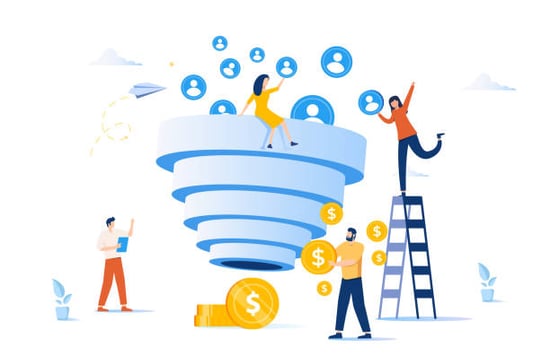The merging worlds of sales and marketing create a dynamic space where customer relations can reign, and CRM can become the cornerstone for success. Any brand or business relies on its customers and the relationships they cultivate with them, and having a CRM system by your side can revolutionise the way you interact with your audience, and by default, optimise and streamline your sales funnel. The more information you can gather on how a potential lead chooses to become a loyal customer, the more you’ll be able to navigate your strategic management in guiding leads through the stages of the sales funnel and nurturing them to foster lasting customer loyalty, using the structure of a CRM.
Introduction To The Sales Funnel Overview
The sales funnel is not just a theoretical construct, but a blueprint that can guide and shape your customer acquisition strategy. It helps you visualise and conceptualise the buyer’s journey of your customers, from their first interaction with your business until their ultimate decision to complete a purchase. This multi-step process can help marketers in navigating potential loopholes or weaknesses in the sales journey to figure out when and why customers are losing interest and not converting.

Typically, a sales funnel is divided into 4 stages:
1. Awareness: It’s all about creating brand awareness amongst potential leads, either through email marketing, online and offline ads and social media, and capturing their initial interest.
2. Interest: This is when your prospects show increasing interest in your products or services, and begin to interact with your brand during their decision-making process, by sending a message or following you on social media. It’s an opportunity to provide them with more information to help them make an informed decision.
3. Decision: There’s heightened consideration to complete a purchase with you and this is your chance to give them all the compelling reasons to do so: why should they opt to go with you over your competition, by highlighting your unique selling points and incentives.
4. Action: The final stage of the sales funnel is when the potential customer decides to complete the purchase with you, which means you have retained a new customer.
The more involved and aware you can be of the sales funnel process, the more you’ll be able to stay on top of any missed opportunities and decreased conversion rates, by fully identifying the points in the buyer’s journey that demand more attention. This is where a CRM system can come in handy in streamlining your process and thus giving you more opportunities to increase your revenue stream and turn potential customers into a loyal, returning community.
The Importance of Managing Leads
Leads may come and go, but loyal customers are forever. Not exactly. It’s up to you to manage all your leads effectively in order to up your chances of converting them as part of your trusted community of buyers. If an individual shows a mere interest in your business or brand, either by following you on social media or subscribing to your newsletter, it is a massive opportunity to become part of their buyer’s journey that must not go unnoticed, as a first step towards eventual conversion. Neglecting this stage can lead to many missed opportunities and lost prospects, before they’ve even had the chance to get a grasp on what you have to offer them.

How CRM Can Optimise Your Sales Funnel Process
That is why bringing in a CRM system can be beneficial in optimising your sales funnel process and act as an essential tool in your strategic lead management. It’s become the most efficient and practical way to make sure that no leads fall through the cracks, by organising, categorising and tracking everything that matters in the conversion timeline.
- Streamlining the Sales Process: CRM has the potential to enhance efficiency by consolidating customer data and interactions into a central hub that is easily accessible by the sales team; anyone who wishes to know more information about how to properly guide leads through the sales funnel, can have access to that information. It allows for tailored strategic approaches that make the sales process more effective and the customer journey more consistent.
- Identifying Opportunities: CRM systems are adept in guiding businesses to identify opportunities that they can take advantage of to push customers through the sales funnel. This can be achieved by carefully monitoring customer behaviours and actions and garnering the right kind of data and insights. Once you figure out who has a bigger potential for conversion and who might require more nurturing or convincing, you can focus your efforts and resources on those who are more likely to convert.
- Measuring Performance: CRM has the capability to measure the performance of the sales funnel and identify which stages require more attention. Any decision-making is always based on reliable data that can efficiently guide the next steps in fine-tuning sales procedures and achieving optimal conversion rates. CRM also enables businesses to track key performance indicators in order to spot any areas of improvement, as well as high points, and make any necessary data-driven decisions needed to elevate the sales funnel’s efficiency.
- Prioritising Leads: Since CRM allows for efficient tracking of customer behaviours, it can also help you with evaluating each lead’s engagement and actions by assigning them a lead score that will highlight the probability of conversion and engagement for each customer. This will allow the sales teams to concentrate their efforts on leads with the highest scores and up the chances of converting them to loyal customers.
- Enhancing Customer Interaction: CRM can aid in crafting better communication and interaction between businesses and leads, by having everything stored in a centralised platform. This ensures that all team members have easy access to the information at all times, while it also allows the automation of communications, such as follow-up emails or responding to DMs. Having a clear, direct and consistent communication with potential customers can be the turning point in their decision-making process, and a CRM’s efficiency in keeping track of everything, can be a great help in the final steps of your sales funnel.
All in all, CRM can be the guiding power throughout your sales funnel process, pin-point your pain points and success heights, in order to be able to streamline and optimise your strategic marketing decisions for turning potential leads into loyal customers. The role of CRM has become pretty integral in navigating the complexities of the sales funnel, especially in the modern age of digital marketing. By harnessing the power of CRM, businesses and brands can navigate the sales funnel by nurturing leads and converting them into returning customers that can be the key in driving a sustained growth pattern and a profitable revenue stream.
If you want to escalate your business objectives and goals, get in touch with us.
.jpg)
